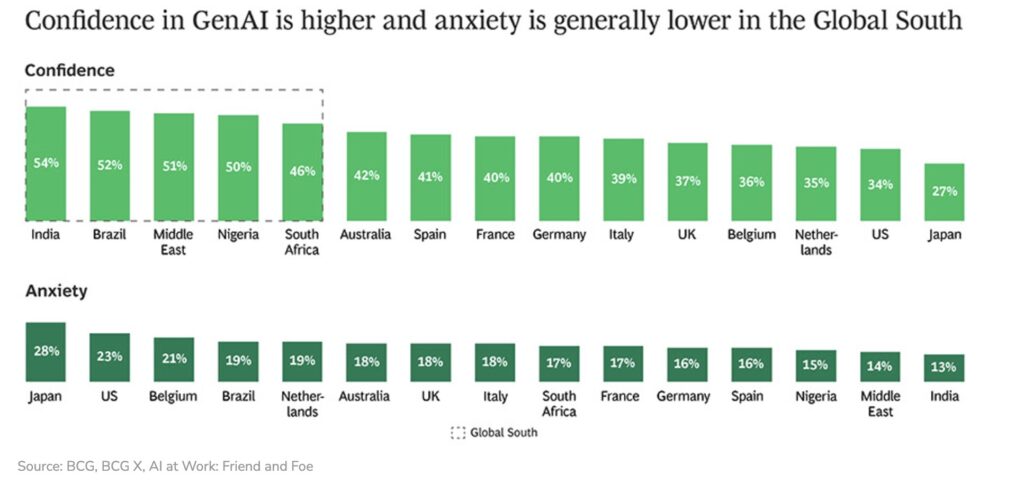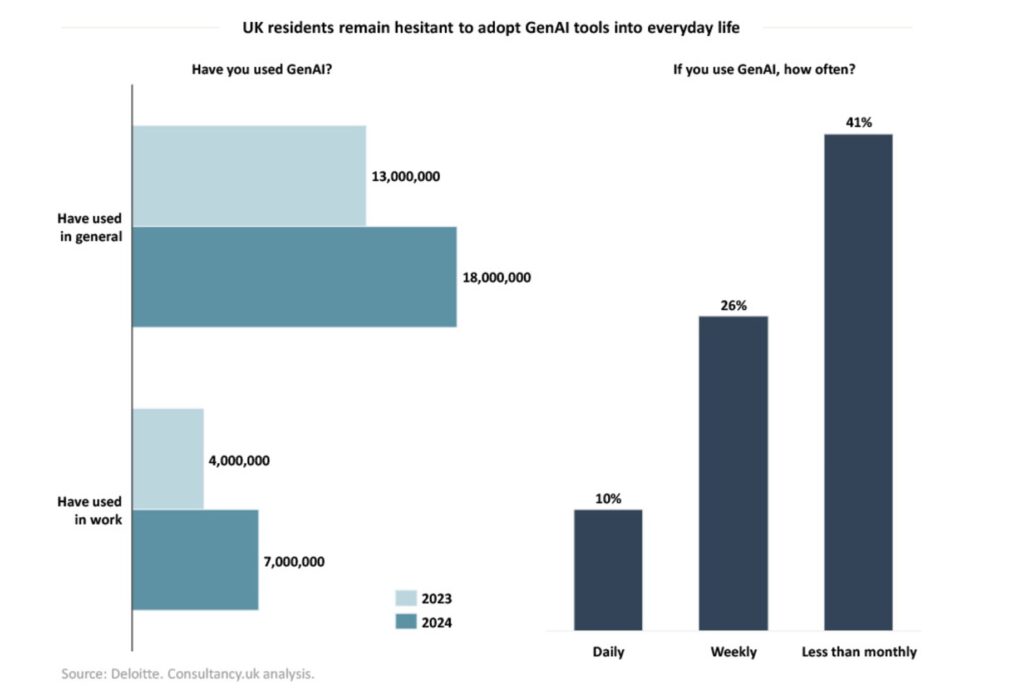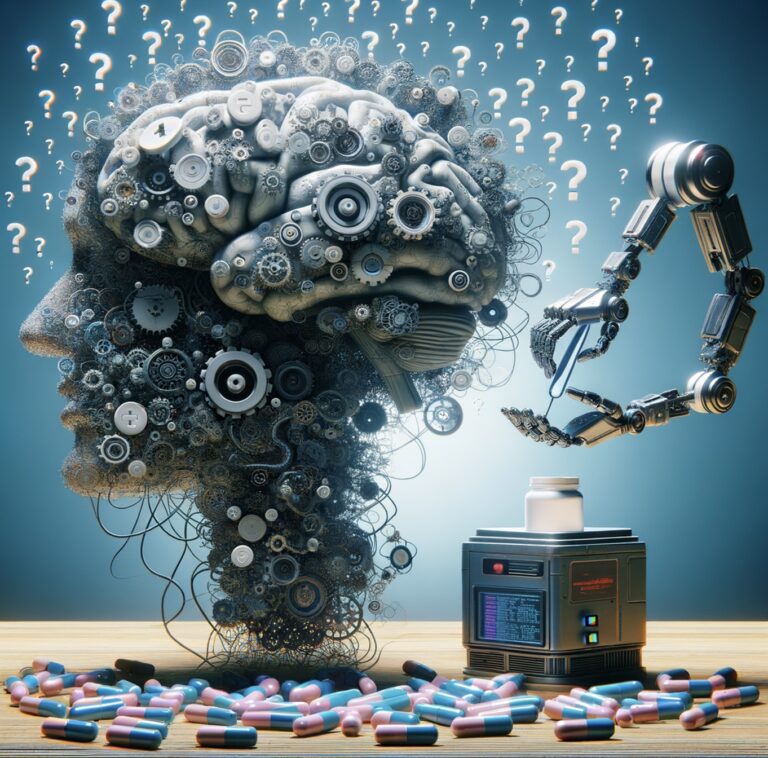In the rapidly evolving pharmaceutical landscape, Generative AI stands as both a transformative force and a test of the industry’s readiness for change. As 2025 approaches, top pharma companies are rapidly integrating GenAI into drug discovery pipelines, clinical trials, regulatory, medical affairs, market access, and sales and marketing.
However, many in pharma still hold misunderstandings about its capabilities, usefulness, and potential impact.
By identifying challenges in mindset, and providing actionable recommendations, this article aims to illuminate pathways for fully leveraging Gen AI to revolutionize your role healthcare.
AI Anxiety: A Key Mindset Barrier to Generative AI Adoption
Despite the substantial buzz and transformative potential surrounding GenAI in the pharmaceutical industry, a significant barrier—AI anxiety—continues to impede its widespread and effective adoption.
Recent studies underscore a stark discrepancy between the optimistic projections of AI integration and the actual engagement levels, particularly in economically developed regions like the Global North.

For example, while 90% of employees in pharma organizations report the use of some form of AI technology, regular engagement remains limited, with only a modest percentage actively utilizing GenAI tools daily. This gap highlights a critical “mismatch” between the touted capabilities of GenAI and the industry’s trust and perception of its utility in everyday workflows.
Key Factors Impacted by GenAI Mindset in Pharma
1. Low Adoption Rates Despite Hype
Reports from leading consulting firms (Deloitte and Oxford University) reveal that, similar to broader workplaces, engagement with GenAI tools in pharma remains minimal. While there is significant investment and interest, only a small fraction of professionals interact with these technologies regularly. This suggests that the anticipated revolution driven by GenAI has yet to be fully realized within the sector.

2. Anxiety and Unease Surrounding AI Implementation
A prevalent anxiety exists among pharma professionals regarding GenAI’s impact:
● Job Security Concerns: Approximately 75% of employees fear that AI could render certain roles obsolete, especially those involving routine data analysis and predictive modeling.
● Overwhelming Pace of Adoption: Many are concerned about the rapid implementation of AI technologies, feeling that the industry is moving too quickly without adequate preparation or training.
● Quality and Reliability Doubts: There is skepticism about the accuracy and dependability of AI-generated outputs, which is crucial in an industry where precision is paramount.
3. Resistance to Hybrid Human-AI Workflows
Pharmaceutical professionals often resist integrating AI into existing workflows due to fears of disrupting established processes. This resistance is fueled by misconceptions that AI aims to replace human expertise rather than augment it. Consequently, organizations may maintain parallel traditional and AI-driven processes, leading to inefficiencies and underutilization of AI’s potential benefits.
4. Fear of Replacing Existing Validated Processes
In an industry governed by stringent regulatory standards, there is a significant fear that introducing AI-driven approaches could compromise validated protocols. Pharma companies hesitate to overhaul well-established methodologies, concerned that untested AI technologies might lead to non-compliance or errors, thereby jeopardizing patient safety and regulatory approval.
5. Risk-Averse Culture in Regulated Environments
The inherently risk-averse culture of the pharmaceutical industry, driven by the high stakes of drug development and patient outcomes, further hinders AI adoption. The emphasis on minimizing uncertainty and avoiding failures makes companies cautious about embracing transformative technologies like GenAI, which come with their own set of uncertainties and risks.
Strategies to Overcome AI Anxiety and Enhance GenAI Engagement in Pharma
Addressing AI anxiety is essential for unlocking the full potential of GenAI in the pharmaceutical sector. A multifaceted approach that combines education, transparent communication, and strategic change management can significantly mitigate fears and foster a more receptive environment for AI integration.
1. Strategic AI Blueprint
Creating a strong AI strategic blueprint to identify how a company can leverage AI to effectively help everyone meet their goals and reduce their current pain points can go a long way in showing teams how it can help them.
2. Education and Skill Development
Comprehensive training programs are crucial in demystifying GenAI and demonstrating its role as a collaborative tool rather than a threat. By investing in upskilling and reskilling initiatives, pharmaceutical companies can empower their workforce to effectively utilize AI technologies, thereby reducing fears of obsolescence and enhancing overall productivity. Interactive workshops, hands-on training sessions, and continuous learning opportunities ensure that employees at all levels develop the necessary competencies to work alongside AI systems.
3. Transparent Communication and Trust Building
Clear and consistent communication about how AI is being implemented and its intended benefits can alleviate uncertainties and build trust among employees. Organizations should articulate the complementary nature of AI and human expertise, emphasizing that AI serves to enhance decision-making processes rather than replace human roles. Involving employees in the AI adoption process through feedback mechanisms and transparent policy discussions can foster a sense of ownership and reduce resistance.
4. Developing Robust Validation Frameworks
To address concerns about the reliability and ethical implications of AI, pharmaceutical companies must establish rigorous validation frameworks. These frameworks should include comprehensive testing protocols to evaluate AI-generated outputs, ensuring they meet regulatory standards and ethical guidelines. By demonstrating the accuracy and dependability of AI tools through validated results, organizations can build confidence in GenAI’s capabilities.
5. Creating Balanced Human-AI Workflows
Integrating AI into existing workflows in a manner that complements human expertise is vital for successful adoption. This involves designing hybrid workflows where AI handles data-intensive tasks such as pattern recognition and predictive analytics, while humans focus on strategic decision-making and complex problem-solving. By fostering a collaborative environment, companies can leverage the strengths of both AI and their workforce, driving innovation and efficiency.
6. Fostering an Open and Adaptive Culture
Cultivating a culture that embraces continuous improvement and technological advancement is essential for overcoming risk-averse tendencies in regulated environments. Leadership must champion the adoption of GenAI by setting a clear vision and encouraging experimentation and innovation. Promoting a growth mindset where challenges are viewed as opportunities for learning can help shift organizational attitudes towards a more positive and proactive stance on AI integration.
7. Strategic Deployment
Organizations must avoid rushing AI implementations and instead focus on deploying responsible, reliable, and well-tested AI systems. Engaging employees in discussions about AI’s role, limitations, and potential benefits can reduce resistance and anxiety, making them active participants in the AI transition. Leaders must prioritize workforce concerns and align AI strategies with ethical practices to gain trust and ensure sustainable adoption.
By systematically addressing AI anxiety through these strategies, pharmaceutical companies can transcend the existing mindset barriers, facilitating the effective adoption of GenAI. This not only enhances operational efficiencies and accelerates drug development but also fosters a culture of innovation and resilience, ultimately leading to improved patient outcomes and sustained competitive advantage in the ever-evolving healthcare landscape.
Action Plan for Mindset Transformation
A comprehensive action plan must be meticulously crafted to navigate the mindset transformation necessary for the integration of GenAI in the pharmaceutical industry.
Assessment tools
Fundamental in this process are assessment tools that include AI literacy tests, surveys to gauge organizational readiness, and diagnostics to understand current workflow dependencies on human expertise versus AI capabilities. Such tools help in identifying gaps in understanding and acceptance of AI technologies, providing a baseline from which progress can be measured.
Action Steps:
● Conduct AI literacy assessments across the organization.
● Utilize surveys to evaluate readiness and identify resistance points.
● Analyze workflow dependencies to tailor AI integration strategies.
Training Programs
Training programs need to be multi-tiered, addressing various levels of expertise from executive decision-makers to lab technicians. These programs should not only focus on technical skills but also on fostering an AI-friendly culture.
Action Steps:
● Develop workshops on AI ethics, data interpretation, and collaborative AI-human partnerships.
● Incorporate real-world case studies to illustrate practical applications.
● Provide continuous learning opportunities to keep pace with AI advancements.
Change Management Strategies
Crucial to mitigating resistance and fostering acceptance are change management strategies that involve clear communication about the benefits of AI, addressing concerns about job security, and emphasizing how AI can augment rather than replace human roles.
Action Steps:
● Utilize the ADKAR model to manage individual and organizational change.
● Implement Kotter’s 8-Step Process to drive AI adoption:
1. Create Urgency
2. Form a Powerful Coalition
3. Create a Vision for Change
4. Communicate the Vision
5. Remove Obstacles
6. Create Short-term Wins
7. Build on the Change
8. Anchor the Changes in Corporate Culture
● Engage change agents who understand both technology and company culture to lead initiatives.
Implementation Roadmap
An implementation roadmap must outline clear, phased steps towards full AI integration. Initially, pilot projects in non-critical areas can test AI applications, providing proof of concept and allowing for iterative improvements.
This roadmap should include:
● Phase 1: AI Strategic Blueprint – Planning the AI strategic blueprint to assist the company reach its’ goals as well as alleviating pain points for specific business units and roles.
● Phase 2: Education and Awareness – Educating all stakeholders on AI basics, potential, and limitations.
● Phase 3: Pilot Implementation – Starting with low-risk, high-impact areas specific to the business needs identified in the blueprint in phase 1.
● Phase 4: Integration with Existing Processes – Gradually incorporating AI into established workflows, ensuring it complements rather than disrupts.
● Phase 5: Expansion and Optimization – Scaling AI applications across the organization, optimizing based on initial results, and continuously refining processes.
● Phase 6: Review and Scale – Regular assessment of AI’s impact on efficiency, innovation, and compliance, with adjustments made for further integration or scaling.
Performance Metrics
Tracking and evaluating Gen AI performance post-implementation is crucial to ensure continuous improvement and alignment with business goals.
Action Steps:
● Establish baseline metrics before AI implementation.
● Continuously monitor and adjust AI models based on performance data.
● Align AI outcomes with strategic business objectives to ensure relevance and effectiveness.
Stakeholder Engagement
Highlight strategies for engaging various stakeholders, including cross-functional teams, to foster a unified approach to Gen AI adoption.
Action Steps:
● Involve cross-functional teams in AI initiative planning.
● Facilitate regular feedback sessions to address concerns and gather insights.
● Promote a collaborative environment to ensure buy-in from all levels of the organization.
Conclusion
The integration of GenAI in the pharmaceutical industry represents a transformative shift that demands a nuanced approach to harness its full potential while mitigating its challenges. While fears of job displacement and concerns about data integrity have initially hindered AI adoption, a strategic mindset shift towards viewing AI as a collaborative enhancer rather than a replacement can unlock significant benefits.
The industry must adopt a balanced strategy, investing in AI literacy, fostering innovation through specialized AI units, and aligning with regulatory standards to ensure ethical and effective use. By embracing AI not as a panacea but as a pivotal tool, pharmaceutical companies can streamline processes, accelerate drug discovery, and ultimately enhance patient outcomes. Stakeholders must reassess and realign their AI strategies, fostering a culture of continuous learning, ethical practice, and proactive collaboration to not only stay competitive but also to lead the healthcare transformation in this AI-driven era.
Found this article interesting?
P.S. Here are 5 ways we can help you accelerate your Pharma AI results:
1. Follow Dr Andrée Bates LinkedIn Profile Now
Dr Bates posts regularly about AI in Pharma so if you follow her you will get even more insights.
2. Listen to our AI for Pharma Growth Podcast
Revolutionize your team’s AI solution vendor choice process and unlock unparalleled efficiency and save millions on poor AI vendor choices that are not meeting your needs! Stop wasting precious time sifting through countless vendors and gain instant access to a curated list of top-tier companies, expertly vetted by leading pharma AI experts.
Every year, we rigorously interview thousands of AI companies that tackle pharma challenges head-on. Our comprehensive evaluations cover whether the solution delivers what is needed, their client results, their AI sophistication, cost-benefit ratio, demos, and more. We provide an exclusive, dynamic database, updated weekly, brimming with the best AI vendors for every business unit and challenge. Plus, our cutting-edge AI technology makes searching it by business unit, challenge, vendors or demo videos and information a breeze.
Discover vendors delivering out-of-the-box AI solutions tailored to your needs.
Identify the best of the best effortlessly.
Anticipate results with confidence.
Transform your AI strategy with our expertly curated vendors that walk the talk, and stay ahead in the fast-paced world of pharma AI!
Get on the wait list to access this today. Click here.
4. Take our FREE AI for Pharma Assessment
When we analysed the most successful AI in biopharma and their agencies, we found there are very specific strategies that deliver the most consistent results year after year. This assessment is designed to give clarity as to how to achieve a successful outcome from AI.
The first step is to complete this short questionnaire, it will give us the information to assess which process is right for you as a next step.
It’s free and obligation-free, so go ahead and complete it now. Plus receive a free link to our a free AI tools pdf and our 5 day training (30 mins a day) in AI in pharma. Link to assessment here.
5. Learn more about AI in Pharma in your own time
We have created an in-depth on-demand training about AI specifically for pharma that translate it into easy understanding of AI and how to apply it in all the different pharma business units — Click here to find out more.
Lorem ipsum dolor sit amet, consectetur adipiscing elit. Ut elit tellus, luctus nec ullamcorper mattis, pulvinar dapibus leo.

